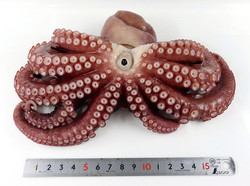
Campaign launched against fledgling octopus aquaculture industry
Editor/ Mohamed Shihab
A new report by Compassion for World Farming argues “the many reasons why plans to develop octopus farming should be stopped and why companies with octopus in their supply chains must avoid sourcing from these intensive farm systems”.
Octopus fisheries are on the decline
It details that wild caught octopuses are consumed all over the world, with the highest consumption in Asia, followed by Europe and the Americas.
In the EU, according to the report, Italy consumes the most octopuses at over 60,000 tonnes per year, followed by Spain and Portugal, with much lower consumption in France and relatively little in the UK.
Most octopus is caught in Asia and the Mediterranean but recently, there has been high demand for octopus in other markets, such as the United States and Japan. As a consequence, the report notes that octopuses have been under increased pressure, leading to a decrease in wild populations.
“Growing market demand and rising prices have made food industries and researchers, particularly in Spain, Mexico, Japan and the US, eager to investigate the feasibility of intensively farming octopuses, with the intention of selling aquaculture octopus from 2023,” it notes.
According to the authors of the report: “Octopuses are highly intelligent, solitary animals, with a fragile physicality. They are a completely unsuitable species to be farmed, where they would be forced into crowded barren environments, with little or no opportunity to express their natural behaviour. Their carnivorous diet would require vast numbers of wild fish to be caught to feed them, which makes farming them unsustainable and damaging to the environment, placing additional pressure on wild fish populations, and depleting the feeding grounds for other marine species. In addition, there are no European or national laws in place to regulate farming practices for cephalopods, which means that octopuses are entirely unprotected from suffering and inhumane slaughter methods.”
As a result, Compassion in World Farming (CWF) has written to the governments in Spain, Japan, Mexico and the US urging them to prevent any further development of octopus farming and is alerting influential food industry players to the serious risks associated with this intensive farming practice.
“Octopuses are solitary by nature and would not fare well in the crowded conditions and high stocking densities that are typical of intensive farm systems. This can result in very poor welfare and creates the risk of aggression and territorialism that can lead to cannibalism,” it argues.
The mortality rate in octopus farming experiments is typically high: the mortality rate average in octopus farming is estimated at 20 percent, but can be as high as 50 percent, according to CWF.
CWF’s reasons to avoid octopus aquaculture
The charity goes on to list further reasons why octopus aquaculture should be avoided.
Octopuses are known for their extraordinary intelligence, and because of their natural inquisitiveness and tendency to explore, manipulate and control their environment, they would be easily susceptible to boredom and frustration in a factory farmed captivity environment.
Octopuses do not have internal or external skeletons and their skin is very fragile and easily damaged. In a farm environment, octopuses are likely to be injured, either through physical contact by a handler or aggressive interactions with other octopuses.
There is currently no validated humane method of slaughter for octopuses. They have complex nervous systems which make it very difficult to kill in accordance with requirements for humane slaughter.
Because octopuses are carnivorous, in a farm environment they would be fed fishmeal and fish oil, which would place further unsustainable pressure on wild fish populations – 90 percent of which are suitable for human consumption - impacting on vulnerable communities and damaging our oceans.
Dr Tracey Jones, global director of food business at Compassion in World Farming, concludes: “Octopuses are sentient, highly intelligent, solitary creatures with complex welfare needs, and as such, are fundamentally unsuited to farming. Unlike other established production systems, commercial octopus farming does not yet exist and with the associated welfare and sustainability issues highlighted in this report, its expansion needs to be stopped in its tracks.
“Octopus farming requires the use of fishmeal and fish oils that depend on wild-caught fish, adding to the already huge ecological impacts of industrial aquaculture which goes against the new ‘Strategic Guidelines for the sustainable development of aquaculture’ adopted by the EU Commission in May 2021. We therefore urge industry to stop the development of octopus farming to prevent the unnecessary suffering of these intelligent and complex creatures and to avoid further environmental destruction.”


ساحة النقاش